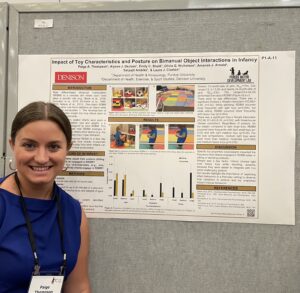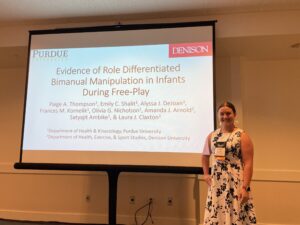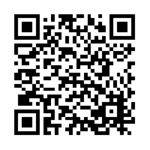Motor development is the study of changes in motor behavior that occur over the lifespan and the processes that drive these changes. Our lab studies motor development in infants, typically from 3 months to 24 months old. Work in our lab includes researching how infants’ abilities to sit, stand, walk, and use their hands to interact with objects change over time. For example, Dr. Claxton has found that when infants hold on to a toy, they are able to stand three times longer and have better control of their balance.
We also investigate how changes in these motor abilities impact developmental and health outcomes, such as language and executive functioning abilities. For example, research in our lab has found that 2-year-olds with better fine motor skills perform better on tasks measuring working memory, problem-solving, and inhibitory control. In infants learning to walk, more mature levels of upper body control are significant predictors of new walkers’ language abilities.
Our group is currently involved in studying how infants learn to balance, fall behaviors in infants, and how object interactions impact infant gait and manual abilities. We are also a data collection site for the PLAY project, which aims to collect naturalistic video data of infants and their mothers in the home setting across the country. This project is funded by NIH. Our lab is also part of an interdisciplinary team that is researching how infants are exposed to opportunities and potential hazards in their environment and how this can impact their health. This project is funded by the EPA.
Click on the icons below to connect with us on social media and learn more about our lab!
Learning to walk leads to a boom in infant language abilities, but why this relationship exists is unclear. Turns out that how infants walk may offer new opportunities for word learning. We found that 13-month-old walking infants with more skilled upper-body control have larger vocabularies. The increased stability likely created by using advanced upper-body control […] Read More
Congratulations to Reagan Frame, a member of the Purdue Motor Development research lab, who was selected as the 2023 American Kinesiology Association National Undergraduate Scholar Award Recipient! See the news here.
Read MorePaige Thompson, a second year PhD student working with Dr. Laura Claxton in the Purdue Motor Development Lab, presented work on the role of object carriage on infant’s fall recovery strategies as well as infant and parent reactions to falls at the Society for Research in Child Development that took place in Salt Lake […] Read More
Paige Thompson, a first year PhD student working with Dr. Laura Claxton in the Purdue Motor Development Lab, presented work on bimanual motor interactions during infancy at the International Congress of Infant Studies that took place in Ottawa, Canada in July 2022. The work that was presented examined how infants incorporate role differentiated bimanual manipulation […] Read More
Paige Thompson, a first year PhD student working with Dr. Laura Claxton in the Purdue Motor Development Lab, presented her work on bimanual motor interactions in infancy at the North American Society for the Psychology of Sport and Physical Activity (NASPSPA) held in Hawaii in June 2022. This work investigated how infants develop role differentiated […] Read More
Independently sitting infants alter sway based on concurrent task demands. Research in our lab has demonstrated that infants reduce sway to better interact with a toy held in their hand (Claxton et al., 2014), and to better focus on a small image viewed on a monitor (Claxton et al., 2013b). Given that these concurrent tasks […] Read More
The Nintendo Wii Balance Board (WBB) has proven to be a valid alternative to a traditional force plate when assessing standing postural sway in a variety of populations, including children and older adults. However, the efficacy of the WBB to capture the dynamics of infants in a sitting posture has not been established. The ability […] Read More
This is an interdisciplinary project involving our lab and Dr. AJ Schwichtenberg’s lab in HDFS. This longitudinal project is investigating early-markers of Autism Spectrum Disorder. Our part of the project involves collecting sitting postural sway data on infants in order to identify key differences in postural control between infants who are at a high-risk and […] Read More









